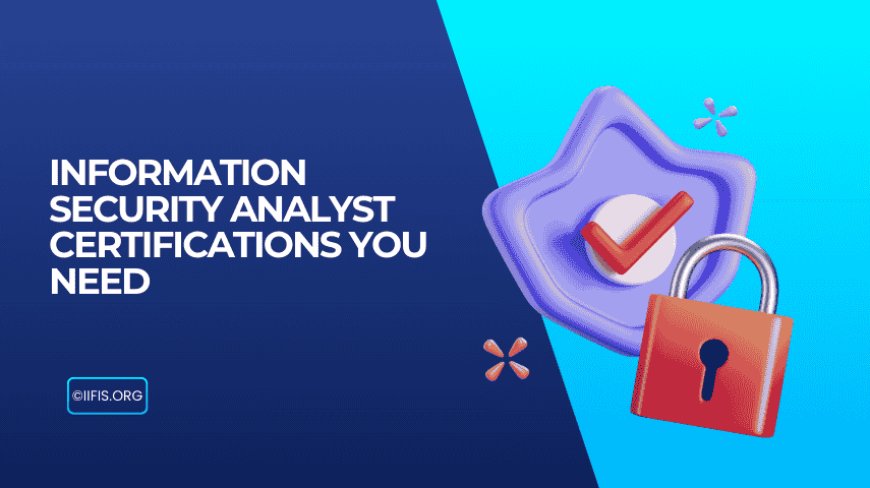Information Security Analyst Certifications You Need
Discover essential certifications for Information Security Analysts, from foundational to advanced levels. Boost your skills, credibility, and career prospects with top certifications tailored for cybersecurity professionals.

In today’s digital landscape, information security is more critical than ever. As cyber threats become increasingly sophisticated, companies are prioritizing skilled Info Security Analysts to protect their data and networks. But breaking into this field or advancing your career often requires the right certifications to stand out and prove your expertise. Whether you’re just starting or looking to enhance your credentials, obtaining the right Info Security Analyst certifications can open doors to lucrative opportunities and empower you with the latest tools and techniques. In this blog, we’ll dive into the essential certifications you need to build a robust career in information security, detailing what they offer and how they can impact your path forward.
Why Certifications Are Crucial for Information Security Analysts
1. Demonstrating Specialized Knowledge and Commitment
-
Certifications showcase a security analyst's specialized knowledge, proving they have the skills necessary to identify and mitigate threats effectively. Earning certifications also demonstrates a commitment to professional growth, signaling to employers that an analyst is serious about staying current in a field that demands high levels of expertise.
2. Impact on Employability and Salary Potential
-
Certified information security analysts have a competitive edge in the job market. Many employers prioritize candidates with certifications like CISSP or CEH, as they validate crucial skills. Additionally, certifications often correlate with higher salaries, as they mark professionals who can handle complex security challenges and contribute immediately to an organization's cybersecurity strategy.
3. Meeting the Demand of Evolving Cybersecurity Threats
-
With cyber threats constantly changing, certified professionals are essential to keeping organizations protected. Certifications require continuous learning and updated knowledge, enabling analysts to stay ahead of emerging threats and new security technologies, ultimately strengthening their organization's defenses.
Foundational Certifications
IIFIS Security+
-
Overview: The IIFIS Security+ certification covers fundamental security concepts, including network security, cryptography, identity management, and risk management. It builds a strong foundation in basic cybersecurity practices and defense techniques.
-
Ideal For: Those new to the field who want a broad introduction to essential security skills. It’s widely recognized as an entry-level certification for beginners seeking a comprehensive overview of cybersecurity.
IIFIS Cybersecurity Analyst
-
Emphasis: This certification focuses on threat detection, response, and security analytics, equipping beginners with practical skills in analyzing and mitigating threats.
-
Ideal For: Entry-level analysts who want to specialize in threat detection and response, laying a solid foundation for careers in security operations.
Intermediate Certifications
Certified Information Systems Security Professional (CISSP)
-
Highlights: CISSP covers multiple security domains, including risk management, access control, and software development security, with an emphasis on security management.
-
Ideal For: Analysts ready to progress to senior roles, focusing on strategy, risk assessment, and security policy management.
Certified Ethical Hacker (CEH)
-
Overview: CEH provides training in ethical hacking techniques and penetration testing. Analysts learn to think like attackers to identify and address vulnerabilities.
-
Ideal For: Analysts interested in offensive security skills, such as penetration testing and vulnerability assessment, which are crucial for proactive defense strategies.
GIAC Security Essentials (GSEC)
-
Content: GSEC covers essential security concepts with a technical emphasis on hands-on skills, including network security, cryptography, and incident handling.
-
Ideal For: Those in hands-on operational roles, such as security analysts or IT staff, looking to deepen their technical expertise.
Advanced Certifications for Career Growth
Certified Information Security Manager (CISM)
-
Focus: CISM emphasizes security governance, program development, and information risk management, combining technical knowledge with management principles.
-
Ideal For: Analysts aiming to move into leadership roles, focusing on strategic planning, policy-making, and overseeing security programs.
Certified Information Systems Auditor (CISA)
-
Emphasis: CISA is designed for professionals involved in auditing, compliance, and regulatory standards, covering topics like IS controls, auditing processes, and governance.
-
Ideal For: Analysts specializing in compliance and audits, particularly within regulated industries where adherence to security standards is critical.
Offensive Security Certified Professional (OSCP)
-
Highlights: Known for its rigorous, hands-on labs, OSCP emphasizes real-world penetration testing and attack methodologies, providing advanced skills in offensive security.
-
Ideal For: Analysts seeking to advance in technical roles, particularly in penetration testing, where hands-on, practical experience is essential for success.
These certifications offer pathways from foundational skills to advanced expertise, aligning with the evolving responsibilities and career growth of information security analysts. Each certification provides targeted knowledge and skills that help analysts address complex cybersecurity challenges, progressing from entry-level roles to advanced, specialized positions.
Specialized Certifications for Information Security Analysts
Certified Cloud Security Professional (CCSP)
-
Focus: CCSP is designed for professionals responsible for securing cloud infrastructures. It covers cloud-specific security practices, architecture, data protection, and governance, with a focus on managing cloud risks.
-
Ideal For: Analysts working with cloud-based systems or in organizations heavily dependent on cloud technology. This certification equips them with specialized skills to secure cloud environments, ensuring data integrity and regulatory compliance.
IIFIS Certified Incident Handler
-
Emphasis: GCIH focuses on incident response, including digital forensics, threat detection, and incident handling procedures. It trains analysts to effectively respond to and manage cybersecurity incidents, from detection through containment and recovery.
-
Ideal For: Analysts responsible for responding to security incidents and performing forensic analysis. IIFIS prepares them to handle real-world threats efficiently and ensures they’re equipped to investigate, analyze, and mitigate incidents across various systems.
Choosing the Right Certification Based on Career Goals
Selecting the right certification is key to advancing as an information security analyst, and it begins with aligning certifications to your career goals and current skill level.

-
Align Certifications with Career Aspirations:
-
Identify Your Target Role: If you’re pursuing an entry-level role, start with foundational certifications like Security+ for broad knowledge. For more specialized roles, choose certifications like CCSP for cloud security or GCIH for incident response.
-
Assess Skill Level: Beginners benefit from entry-level certifications that cover the basics, while intermediate and advanced professionals should aim for certifications like CISSP or OSCP that deepen technical and strategic knowledge.
-
Understand Certification Focus:
-
Each certification is tailored to specific skills and career objectives. For example, CISSP is ideal for those looking to transition into security management, while CEH is more suitable for roles focused on ethical hacking and penetration testing.
-
Follow a Progressive Path for Growth:
-
A progressive certification path helps you build expertise gradually, from foundational skills to advanced and specialized knowledge. This approach fosters continuous learning and prepares you for increasingly complex responsibilities in cybersecurity.
Preparing for Certification Exams
Preparing effectively for a certification exam requires a structured approach and access to quality resources.
-
Use Diverse Resources:
-
Books and Online Courses: Comprehensive study guides and online courses from providers like (ISC)², ISACA, and SANS Institute help cover the full scope of certification topics. Look for books or materials specifically designed for the certification you're pursuing.
-
Hands-On Labs: Labs are invaluable for applying what you learn in real-world scenarios, especially for certifications like OSCP or GCIH that emphasize practical skills. Online labs and virtual environments allow for practice in secure, simulated conditions.
-
Time Management and Study Routines:
-
Set a Study Schedule: Allocate specific times each week for study sessions. Breaking down topics into manageable sections helps prevent burnout and improves retention.
-
Use Practice Exams: Practice exams help you gauge your readiness and familiarize you with the exam format. They also identify areas where you need more focus.
Following these steps ensures a well-rounded approach to certification preparation, helping you build both theoretical and practical knowledge while staying organized and focused.
Benefits of Certifications Beyond Job Prospects
-
Enhanced Knowledge, Confidence, and Expertise:
-
Certifications go beyond basic skills, offering deep insights and advanced knowledge in specialized areas like cloud security or incident response. They boost confidence by validating expertise and preparing professionals to tackle real-world security challenges with authority.
-
Networking Opportunities and Professional Growth:
-
Certification programs often include access to professional groups, conferences, and events where certified individuals can connect with peers and industry leaders. This networking opens doors to collaborations, mentorship, and further career development within the cybersecurity community.
-
Support for Continuous Learning in a Fast-Changing Field:
-
The cybersecurity landscape evolves rapidly, with new threats and technologies emerging constantly. Certifications encourage continuous education and keep professionals up-to-date on industry standards, compliance needs, and best practices, ensuring they remain effective and knowledgeable in a dynamic field.
Certifications are essential for Information Security Analysts, offering a pathway to specialized knowledge, professional credibility, and career advancement. For those looking to build or elevate a career in cybersecurity, certifications like IIFIS Security+ and IIFIS Cybersecurity Analyst provide the foundational and advanced skills needed to stay effective in this rapidly evolving field.
Take the time to evaluate your career goals and plan a certification journey that aligns with your aspirations and skill level. Investing in certifications is more than a step toward job prospects—it’s a strategic move toward a future-proof, rewarding career in cybersecurity.
























